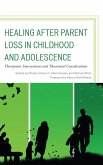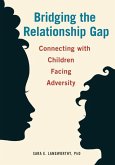Larissa N Niec
Strengthening the Parent-Child Relationship in Therapy
Laying the Foundation for Healthy Development
Larissa N Niec
Strengthening the Parent-Child Relationship in Therapy
Laying the Foundation for Healthy Development
- Broschiertes Buch
- Merkliste
- Auf die Merkliste
- Bewerten Bewerten
- Teilen
- Produkt teilen
- Produkterinnerung
- Produkterinnerung
This book integrates the basic and applied literature to provide mental health providers with concrete, evidence¿based strategies for building and strengthening the parent¿child relationship and addresses challenges typically neglected by intervention manuals.
Andere Kunden interessierten sich auch für
![Strengthening Family Resilience Strengthening Family Resilience]() Froma WalshStrengthening Family Resilience47,99 €
Froma WalshStrengthening Family Resilience47,99 €![Negotiating Parent-Adolescent Conflict Negotiating Parent-Adolescent Conflict]() Arthur L RobinNegotiating Parent-Adolescent Conflict39,99 €
Arthur L RobinNegotiating Parent-Adolescent Conflict39,99 €![Serious Advice Of A Parent To His Children Concerning The Errors Of The Day (1734) Serious Advice Of A Parent To His Children Concerning The Errors Of The Day (1734)]() A TradesmanSerious Advice Of A Parent To His Children Concerning The Errors Of The Day (1734)13,99 €
A TradesmanSerious Advice Of A Parent To His Children Concerning The Errors Of The Day (1734)13,99 €![Healing After Parent Loss in Childhood and Adolescence Healing After Parent Loss in Childhood and Adolescence]() Healing After Parent Loss in Childhood and Adolescence40,99 €
Healing After Parent Loss in Childhood and Adolescence40,99 €![Mindfulness and the Therapeutic Relationship Mindfulness and the Therapeutic Relationship]() Mindfulness and the Therapeutic Relationship37,99 €
Mindfulness and the Therapeutic Relationship37,99 €![Couples Therapy Couples Therapy]() Linda Berg CrossCouples Therapy68,99 €
Linda Berg CrossCouples Therapy68,99 €![Bridging the Relationship Gap Bridging the Relationship Gap]() Sara E LangworthyBridging the Relationship Gap27,99 €
Sara E LangworthyBridging the Relationship Gap27,99 €-
-
-
This book integrates the basic and applied literature to provide mental health providers with concrete, evidence¿based strategies for building and strengthening the parent¿child relationship and addresses challenges typically neglected by intervention manuals.
Produktdetails
- Produktdetails
- Verlag: American Psychological Association (APA)
- Seitenzahl: 285
- Erscheinungstermin: 9. August 2022
- Englisch
- Abmessung: 251mm x 175mm x 18mm
- Gewicht: 499g
- ISBN-13: 9781433836664
- ISBN-10: 1433836661
- Artikelnr.: 63122656
- Herstellerkennzeichnung
- Libri GmbH
- Europaallee 1
- 36244 Bad Hersfeld
- gpsr@libri.de
- Verlag: American Psychological Association (APA)
- Seitenzahl: 285
- Erscheinungstermin: 9. August 2022
- Englisch
- Abmessung: 251mm x 175mm x 18mm
- Gewicht: 499g
- ISBN-13: 9781433836664
- ISBN-10: 1433836661
- Artikelnr.: 63122656
- Herstellerkennzeichnung
- Libri GmbH
- Europaallee 1
- 36244 Bad Hersfeld
- gpsr@libri.de
Dr. Larissa N. Niec is a Professor of Psychology and the Director of the Center for Children, Families, and Communities at Central Michigan University. She has been a parent amp ndash child interaction therapy (PCIT) clinician, trainer, and researcher for nearly 3 years. Dr. Niec is involved in national and international efforts to disseminate effective treatments to community therapists. She has written extensively on the evidence-based use of play in clinical practice and on parent amp ndash child interaction therapy.
Part I: The Influence of the Parent-Child Relationship on Child Development
Chapter 1. When I Need You, You're Here: Initiation of the Parent-Child
Relationship
Chapter 2. Keep the First Domino Standing: How Healthy Parenting Builds
Healthy Children
Chapter 3. Risk and Disruption in the Parent-Child Relationship
Part II: Repairing & Strengthening the Parent-Child Relationship in Therapy
Chapter 4. Determining Treatment Targets and Monitoring Progress: The
Importance of Assessment
Chapter 5. Fostering Responsive Parenting
Chapter 6. When Negative Emotion is a Positive Experience: Healthy
Limit-Setting in the Parent-Child Relationship
Chapter 7. Relationship-Based Interventions for Parents and Young Children
Part III: Overcoming Barriers to Success
Chapter 8. Engaging Fathers in Treatment
Chapter 9. Difficult Cases, Therapist Burnout, and the Importance of
Self-care
Chapter 10. Knocking Down Barriers to Effective Treatment: A Call for
Advances and Culture Shifts
Chapter 1. When I Need You, You're Here: Initiation of the Parent-Child
Relationship
Chapter 2. Keep the First Domino Standing: How Healthy Parenting Builds
Healthy Children
Chapter 3. Risk and Disruption in the Parent-Child Relationship
Part II: Repairing & Strengthening the Parent-Child Relationship in Therapy
Chapter 4. Determining Treatment Targets and Monitoring Progress: The
Importance of Assessment
Chapter 5. Fostering Responsive Parenting
Chapter 6. When Negative Emotion is a Positive Experience: Healthy
Limit-Setting in the Parent-Child Relationship
Chapter 7. Relationship-Based Interventions for Parents and Young Children
Part III: Overcoming Barriers to Success
Chapter 8. Engaging Fathers in Treatment
Chapter 9. Difficult Cases, Therapist Burnout, and the Importance of
Self-care
Chapter 10. Knocking Down Barriers to Effective Treatment: A Call for
Advances and Culture Shifts
Part I: The Influence of the Parent-Child Relationship on Child Development
Chapter 1. When I Need You, You're Here: Initiation of the Parent-Child
Relationship
Chapter 2. Keep the First Domino Standing: How Healthy Parenting Builds
Healthy Children
Chapter 3. Risk and Disruption in the Parent-Child Relationship
Part II: Repairing & Strengthening the Parent-Child Relationship in Therapy
Chapter 4. Determining Treatment Targets and Monitoring Progress: The
Importance of Assessment
Chapter 5. Fostering Responsive Parenting
Chapter 6. When Negative Emotion is a Positive Experience: Healthy
Limit-Setting in the Parent-Child Relationship
Chapter 7. Relationship-Based Interventions for Parents and Young Children
Part III: Overcoming Barriers to Success
Chapter 8. Engaging Fathers in Treatment
Chapter 9. Difficult Cases, Therapist Burnout, and the Importance of
Self-care
Chapter 10. Knocking Down Barriers to Effective Treatment: A Call for
Advances and Culture Shifts
Chapter 1. When I Need You, You're Here: Initiation of the Parent-Child
Relationship
Chapter 2. Keep the First Domino Standing: How Healthy Parenting Builds
Healthy Children
Chapter 3. Risk and Disruption in the Parent-Child Relationship
Part II: Repairing & Strengthening the Parent-Child Relationship in Therapy
Chapter 4. Determining Treatment Targets and Monitoring Progress: The
Importance of Assessment
Chapter 5. Fostering Responsive Parenting
Chapter 6. When Negative Emotion is a Positive Experience: Healthy
Limit-Setting in the Parent-Child Relationship
Chapter 7. Relationship-Based Interventions for Parents and Young Children
Part III: Overcoming Barriers to Success
Chapter 8. Engaging Fathers in Treatment
Chapter 9. Difficult Cases, Therapist Burnout, and the Importance of
Self-care
Chapter 10. Knocking Down Barriers to Effective Treatment: A Call for
Advances and Culture Shifts








